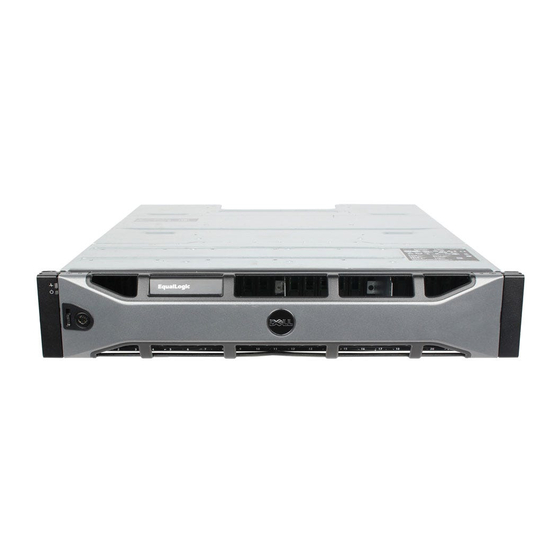Dell EqualLogic PS Series Maintenance du matériel - Page 25
Parcourez en ligne ou téléchargez le pdf Maintenance du matériel pour {nom_de_la_catégorie} Dell EqualLogic PS Series. Dell EqualLogic PS Series 46 pages. Storage arrays
Également pour Dell EqualLogic PS Series : Mise en place (2 pages), Manuel du propriétaire du matériel (50 pages), Manuel du propriétaire du matériel (48 pages)

PS5000 Hardware Maintenance
Network Configuration Recommendations
It is recommended that you follow the guidelines in the table shown next. In
addition, all the usual rules for proper network configuration apply to group
members. General network configuration is beyond the scope of this manual.
Table 3-3: Network Recommendations
Recommendation Description
Switched Gigabit
Ethernet network
Multiple network
connections
Access to the group
IP address
Redundant network
paths
For replication, a
reliable, adequately
sized network link
No STP
functionality on
switch ports that
connect end nodes
Flow Control
enabled on switches
and NICs
Connect arrays and hosts to a switched network and ensure that all
network connections between hosts and arrays are Gigabit
Ethernet. An array can operate at 10 and 100 Mbits, but
performance will be significantly degraded.
For increased bandwidth and availability, connect multiple
network interfaces to the network (and different switches, if
possible). Connect interfaces in the following order: Ethernet 0,
Ethernet 1, and Ethernet 2.
After the initial setup, use the Group Manager GUI or CLI to
assign an IP address and netmask to each additional interface.
In a multi-subnet group, each configured network interface should
have access to the subnet on which the group IP address resides.
Using a multipathing solution helps to ensure that no single point
of failure exists between hosts and arrays.
For effective and predictable replication, be sure that the network
link between the primary and secondary groups is reliable and
provides sufficient bandwidth for copying data.
Do not use Spanning-Tree (STP) on switch ports that connect end
nodes (iSCSI initiators or storage array network interfaces).
However, if you want to use STP or RSTP (preferable to STP),
you should enable the port settings available on some switches
that let the port immediately transition into STP forwarding state
upon link up. This functionality can reduce network interruptions
that occur when devices restart, and should only be enabled on
switch ports that connect end nodes.
Note: The use of Spanning-Tree for a single-cable connection
between switches is encouraged, as is the use of trunking
for multi-cable connections between switches.
Enable Flow Control on each switch port and NIC that handles
iSCSI traffic. PS Series arrays will correctly respond to Flow
Control.
Maintaining Control Modules
3–5
